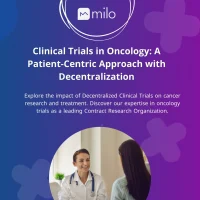As a medical area that is always in search of more and better solutions to improve the quality of life of patients, oncology is a fecund field of medical research. Clinical trials in oncology play an essential role in the development of cancer treatment drugs and devices and is one of our areas of expertise as a Contract Research Organization.
In this article, we share some of our knowledge about oncology clinical research and its challenges. Before we focus on how Decentralized Clinical Trials can benefit researchers and cancer patients, we briefly introduce the concept of DCTs for those who are not familiar with it. Share this article with someone who might benefit from learning the role of oncology clinical trials in healthcare.
Clinical Trials in Oncology
Oncology is the field of medicine that investigates, diagnoses and treats cancer (or suspected cancer). It is a broad area of expertise which includes preventive medicine, several kinds of therapies (chemotherapy, immunotherapy, radiation therapy and various drugs), surgeries and palliative medicine.
Clinical trials in oncology are conducted to test the safety and efficacy of new ways to find, prevent and treat cancer. Clinical research in oncology also aims at testing new ways of mitigating cancer symptoms and the side effects of the treatment, improving the quality of life of patients.
Cancer is a life-threatening and often incurable disease which unfortunately affects many patients in all parts of the world, ages and social groups. Clinical trials can represent a new hope for patients with advanced stage cancer or that haven’t been responding well to existent treatments.
It is thanks to clinical trials that people with cancer can live longer today than in the past, and the ongoing research that is done now is helping future patients. Many cancer patients choose to join clinical trials to help improve cancer care for the next generations, and healthy volunteers also join trials to help to improve the knowledge on early diagnosis.

Challenges in Oncology Clinical Research
Despite the fact that clinical trials play such a fundamental role in advancing oncology and improving patient care, there are still many challenges faced by researchers in this area. The most significant one is related to patient recruitment and retention. Clinical trials often do not reach sufficient recruitment rates, which hinders even the best planned studies.
As we will discuss further in this article, decentralized clinical trials can be a way of dealing with this challenge and improve research outcomes. But why are patient recruitment rates low, if the relevance of clinical trials in oncology is already recognized? These are some possible reasons :
- Site access: some patients are eligible for a specific cancer trial, but they live too far away from the study center, and participating would require expensive and time-consuming trips.
- Lack of awareness: often, people will not enroll to participate in a trial simply because they do not know that they have this opportunity. The responsibility may fall on doctors, sometimes, who, as medical practitioners directly in contact with patients, could inform them better of the possible outcomes of participating in a trial.
- Patient concerns: this is related to lack of awareness, since many patients do not feel confident, with the information they have, to take part in the testing of a new drug or medical device that still needs to be approved by regulatory authorities. Good communication is needed to ensure that patients know about the scientific research behind trials and how they will receive help in the case of adverse events.
There are some other challenges affecting oncology clinical trials that are not directly related to patient recruitment and retention. Clinical research in oncology can take more years than in other fields to yield results, and this is paired with the urgency and pressure on researchers to find new treatments to this life-threatening condition. The inclusion of surrogate endpoints (correlated with real endpoints but with no guaranteed relationship) is common but may also represent a challenge in research, since they may not adequately represent the efficacy of new drugs for cancer treatment.
Decentralized Clinical Trials (DCTs)
Now that we have already introduced oncology research and some of its challenges, we can briefly introduce the concept of Decentralized Clinical Trials (DCTs) before explaining how they can improve the design and implementation of clinical trials in oncology. As you will see, these types of trials are advancing clinical research in many areas, but they can be particularly beneficial to cancer patients.
As the name indicates, a decentralized clinical trial is one that has its activities being conducted in more than one location, rather than exclusively in a chosen study center (as happens with traditional clinical trials). These other locations may be the patient’s home, their preferred local health center or a laboratory closer to them.
DCTs rely on digital health technologies to enable remote patient monitoring and communication between doctors, nurses and patients. There is a wide range of tools, software and devices which enable decentralized trials, such as wearable activity trackers, blood pressure monitors and interactive mobile applications.
How DCTs can Enhance Clinical Trials in Oncology ?
Many of the challenges that researchers face when conducting oncology clinical trials can be mitigated, if not avoided, by implementing fully virtual or hybrid studies. We have discussed how lack of awareness, difficulty in site access and patient concerns can hinder oncology clinical trials, and, in this section, we give a detailed list of benefits of DCTs to patients and then to researchers.
Benefiting both groups is important because the success of a clinical trial depends on patient recruitment and satisfaction as much as it depends on researchers access to high quality data and effective communication with participants. DCTs have the power to improve the experience of both sides, increasing the chances of having positive outcomes.
Benefits to Patients
- Reducing travel needs: cancer patients often have limited disposition and emotional availability to leave their homes too often, and participating in a clinical trial that requires constant trips to the study center can be too heavy on them. If they can participate virtually, they may stay comfortable at home more frequently.
- Less changes in their routines: remote monitoring can be done in real time and with wearable devices, providing doctors with detailed symptoms reporting and treatment effects with minimal disturbance to the patient’s daily routine. This is a huge benefit to patients that may already be dealing with invasive and uncomfortable treatments, as is often the case with cancer patients.
- Increasing diversity and awareness: DCTs are not limited to one restricted geographic location, allowing people from a wider area to enroll. As a result, the participant’s pool will be more inclusive and diverse, benefiting cancer patients that otherwise may not have access to innovative treatments. Moreover, the awareness about the trials and knowledge about their relevance is higher with DCTs, as they do not rely only on a single study center and a reduced number of medical professionals to inform patients.

Benefits to Researchers
- Increased access to relevant data: in traditional clinical trials, researchers are often subject to patient’s hesitation in reporting symptoms and adverse reactions as soon as they arise. This is totally understandable from the point of view of cancer patients, who shouldn’t be expected to travel to a study site as often as they have new (and sometimes apparently “minor”) concerns to report. With DCTs, researchers can maintain regular communication with patients, who may also feel more encouraged to report symptoms and reactions if they can do it via videocalls or even messaging and mobile applications.
- More diverse knowledge: having a more diverse pool of participants is beneficial not only to patients, but it also helps researchers have access to a broader view of the treatment they are developing and its effects on different groups of patients. DCTs allow for more inclusive trials which can be more easily replicated and compared with by researchers working in different parts of the world.
- Longitudinal data is made available: real time monitoring enabled by DCTs generates reports that represent a continuous (longitudinal) view of the patient’s status, as opposed to the “snapshots” made during visits to the study site in traditional trials. This is beneficial because it creates a more precise picture of the patient’s situation (e.g., how frequently a specific symptom occurs during the week)
Challenges to Decentralizing Clinical Trials in Oncology
After our years of experience with DCTs and having supported many different clinical trials, we are aware that implementing digital health technologies may not be a simple process. This is why most companies that are developing new cancer treatments choose to partner with an experienced oncology CRO to conduct clinical trials. These are some of the challenges that oncology researchers may face when implementing DCTs:
- Training clinical site staff to conduct videoconferencing appointments
- Storing and shipping drugs to patient’s home under the required conditions to maintain the drug’s stability
- Running blood tests that must be undertaken within a short time after the medicine intake
- Finding qualified medical personnel to work with patients remotely and to make home visits if necessary (e.g. chemotherapy or immunotherapy nurses.
In this article, we have explored the many benefits that decentralization offers to oncology clinical trials, an essential part of oncology research and the starting point to improve the lives of cancer patients of all types. We have also acknowledged some challenges that may be faced when implementing a DCT. Researchers can adopt a hybrid model, digitizing some parts of the study that can benefit more from digital health technologies.
Summary
- Oncology is the field of medicine that investigates, diagnoses and treats cancer
- Clinical trials in oncology are conducted to test the safety and efficacy of new ways to find, prevent and treat cancer
- There are still many challenges faced by researchers in this area. The most significant one is related to patient recruitment and retention
- A decentralized clinical trial is one that has its activities being conducted in more than one location, rather than exclusively in a chosen study center
- Many of the challenges that researchers face when conducting oncology clinical trials can be mitigated, if not avoided, by implementing DCTs
- Some of the benefits of DCTs to patients are reducing travel needs, having less changes in their routines and increasing diversity and awareness
- The benefits to researchers are increased access to relevant data, more diverse knowledge and availability of longitudinal data







